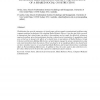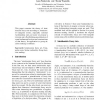432 search results - page 7 / 87 » The use of recognition in group decision-making |
HICSS
2005
IEEE
15 years 4 months ago
2005
IEEE
E-learning growth is driven by global, societal, and technological changes that both enable and require increased worker and learner mobility, access to distributed domain experti...
ECIS
2004
15 years 20 days ago
2004
Globalization has seen the emergence of virtual teams solving complex organisational problems using computer-mediated technologies. By extending Media Richness Theory, it was the ...
CVPR
2000
IEEE
16 years 1 months ago
2000
IEEE
Recognition using only visual evidence cannot always be successful due to limitations of information and resources available during training. Considering relation among lexicon en...
MANSCI
2006
14 years 11 months ago
2006
The problem of group ranking, a.k.a. rank aggregation, has been studied in contexts varying from sports, to multi-criteria decision making, to machine learning, to ranking web pag...
EUSFLAT
2003
15 years 20 days ago
2003
This paper concerns the theory of intuitionistic fuzzy sets according to Atanassov. If triangular norms, especially nonstrict Archimedean ones, are used, we propose a revision and...



